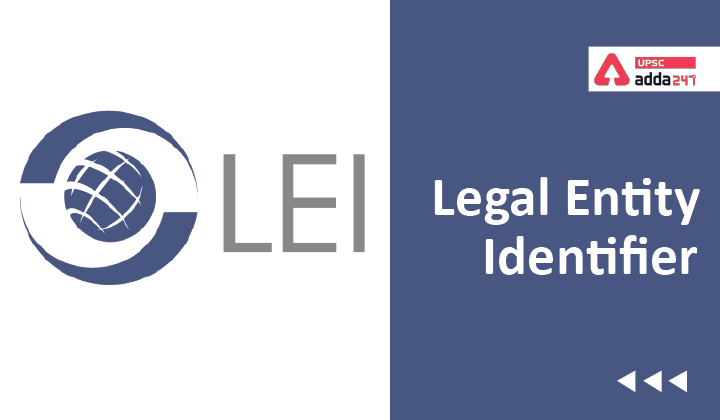Table of Contents
Legal Entity Identifier: Relevance
- GS 3: Indian Economy and issues relating to planning, mobilization, of resources, growth, development and employment.
Legal Entity Identifier: Context
- RBI has recently said that from October next year, companies will have to quote the legal entity identifier (LEI) number so as to undertaking cross-border transactions of Rs 50 crore or more.
What is LEI?
- The Legal Entity Identifier (LEI) is a 20-character alpha-numeric code used to uniquely identify parties to financial transactions worldwide.
- The Legal Entity Identifier (LEI) is a reference code — like a bar code — used across markets and jurisdictions to uniquely identify a legally distinct entity that engages in a financial transaction.
- The LEI is designed to be a linchpin for financial data — the first global and unique entity identifier enabling risk managers and regulators to identify parties to financial transactions instantly and precisely.
Why LEI needed?
- When Lehman Brothers collapsed in September 2008, regulators and private-sector firms were unable to assess quickly and fully the extent of market participants’ exposure to Lehman and how the vast network of market participants was connected.
- The financial crisis underscored the need for a global system to identify financial connections, so regulators and private sector firms could better understand the true nature of risk exposures across the financial system.
- The establishment of the global LEI system is a significant achievement that responds to these vulnerabilities and provides meaningful, long-term benefits for the public and private sectors.
LEI purpose
- To improve the quality and accuracy of financial data reporting systems for better risk management.
- To create a global reference data system that uniquely identifies every legal entity in any jurisdiction that is party to a financial transaction.
LEI can be obtained from?
- Any of the Local Operating Units (LOUs) accredited by the Global Legal Entity Identifier Foundation (GLEIF), the body tasked to support the implementation and use of LEI.
- In India, LEI can be obtained from Legal Entity Identifier India Ltd. (LEIL), which is also recognised as an issuer of LEI by the Reserve Bank.
Which transactions should include LEI information?
- All single payment transactions of ₹50 crore and above undertaken by entities (non-individuals) should include remitter and beneficiary LEI information.
- It is applicable to transactions undertaken through the NEFT and RTGS payment systems.
- In case of RTGS, both customer payment and inter-bank transactions, meeting the above criterion, should include LEI information.
Is LEI required for Central Government or State Governments and/or their departments?
- It is not necessary for Governments or their Departments / Ministries to obtain LEI or mention LEI number for payment transactions in NEFT and RTGS.
- However, Corporations / Undertakings, including those fully owned by the Government, shall need to obtain LEI.
Is LEI required for individual customer transactions?
- No, LEI is not required for customer transactions where both remitter and beneficiary are individuals.
Also Read:





 TSPSC Group 1 Question Paper 2024, Downl...
TSPSC Group 1 Question Paper 2024, Downl...
 TSPSC Group 1 Answer key 2024 Out, Downl...
TSPSC Group 1 Answer key 2024 Out, Downl...
 UPSC Prelims 2024 Question Paper, Downlo...
UPSC Prelims 2024 Question Paper, Downlo...





